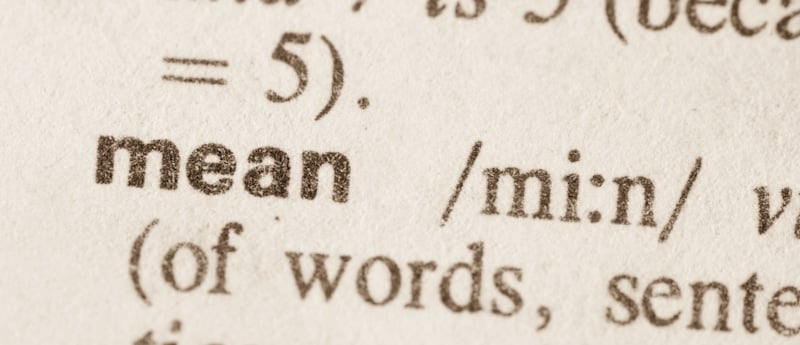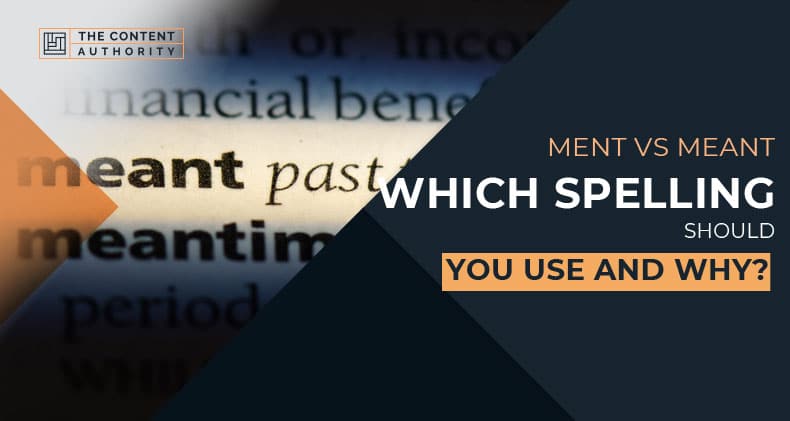When we write a text without spelling mistakes and with coherence, it is a source of pride. Good spelling is a basic necessity that brings us benefits. We should not overlook; when we write correctly, we leave good and pleasant sensations in our audience. But to achieve this type of writing requires previous and continuous preparation. It is a task that never ends because our language is very rich in words. Today, we will look at the words “ment” and “meant.” Do you know which is the correct spelling?
We have to say that “meant,” and “ment” are not synonyms. “Meant” is the past tense of “mean.” On the other hand, “ment” is a suffix that people put at the end of a word to convert it from a verb to a noun. Additionally, “ment” is an obsolete past tense of “mean.”
We all know that spelling mistakes are frowned upon and project a negative image of poor preparation and lack of attention to detail on the writer’s part. But in addition to spelling mistakes, we can also have slipups related to the incorrect use of words. If we want to express an idea and we use the wrong words, we will not make a good impression. Stay with us to clear all your doubts about the correct use of the words “meant” and “ment.”

What Is The Definition Of “Mean” (Meant)?
“Mean” is a word that has multiple meanings and uses. In the following list, we will study its main definitions.
Mean As A Verb
- To convey or express the meaning of something. To denote or connote.
- To have a specific purpose in mind.
- To intend or designate something for a specific purpose.
- To intend to express or convey something. To plan to give meaning to something.
- To intend to refer to someone.
- To conclude a logical consequence.
- To give a degree of importance to something.
Mean As An Adjective
- Something that approaches the statistical norm or expected mean value.
- Something that conforms to a standard, type, or social norm. Something that is not abnormal.
- Someone whose main character has a lack of generosity.
- A person who is reluctant to spend.
- To refer to sums of money that are so small as to merit contempt.
- Something that has no value.
- A person who is deserving of contempt or indifference.
- Something that has characteristics of extreme poverty.
- A person who is poor or indicates poverty.
- A person who has malice or ill-humor characteristics.
- A person who shows a lack of honor or morality. Someone ignoble.
- Someone who is completely lacking in nobility, quality, or purpose.
- Someone who demonstrates a unique ability.
Mean As A Noun
- Average of numbers by adding and dividing the number of elements that make up that set.
- Something intermediate.
- The middle point between two extremes
- Either of the two middle terms of a ratio.
- Something useful or profitable for a particular purpose.
- The material resources that allow a secure life.
What Is The Origin Of The Word Mean (Meant)?
- The word “mean” dates back to the 13th century. English borrowed the word “mean” from the Old French “meien” and the Latin “medianus.” At that time, “mean” meant “something in between.” Other “mean” definitions for the period were: someone cruel or unworthy.
- Later, in 1840, the English used the word “mean” to refer to stingy people. In contrast, the Americans used “mean” to refer to bad drunks or crude people.
- During the 1900s, in the United States, “mean” began to express “something outstanding.” Mean also became a word to indicate that someone had an extraordinary ability or skill. What is the origin of the word mean (meant)?
What Is The Definition Of Ment?
While it is true that “ment” does not have as many different definitions as we find with “mean,” it does not mean that it is unimportant in our language. We will now look at the main definitions of “ment.”
- Ment is the obsolete past tense of the verb “mean.”
- Ment is a fairly common suffix of Latin origin. It is a suffix that is added to verbs to create nouns. These nouns usually describe the results of an act or are the act itself. It is a suffix that people add to almost any verb. Some examples are:
Aliment – Fragment – Commandment – Document – Monument – Government.
What Is The Origin Of The Word “Ment”?
Ment is a typical Latin suffix used to form nouns. This suffix initially comes from the French and Latin “mentum.” People added this suffix to verb roots to make new nouns. These new nouns indicated the result of an action of the verb or the instrument of the action. The English have been using ment with verb roots since the 16th century.
How Do People Use The Word “Mean” And “Ment”?
The words we are analyzing have a general and everyday use among people. It isn’t easy to think of anyone who has not used them at least once in their life. Below we will review some of their uses.
Uses Of The Word “Mean”
- To say that someone did not intend to do something.
- To express that someone does not understand what another person is saying and is looking for a more detailed explanation.
- To know what a situation or event represents to another person.
- To express empathy from one person to another.
- To go even deeper into a topic or point of view.
- To say that two events occurred simultaneously.
- To imply something in the hope that others will understand the implicit message.
Uses Of The Word “Ment”
Ment is a suffix. A suffix is several letters people place at the end of a word to create a new word. In the case of words ending in “ment,” they are most likely to be nouns. For these reasons, the use of “ment” applies to almost everything.
Examples Of The Use Of The Word “Mean” And “Ment”
Without delaying what we all expect, we will now look at several examples of using these words in everyday sentences.
Examples Of Mean
- I meant to sound mean with the above comment.
- What you meant to say was that you were inviting me to dinner?
- John is always trying to get us to think like him; you know what I mean?
- Mario thought that by being mean he was going to get us to work with him.
- What Sophie meant was that she wasn’t interested in your proposal.
- When she said: “Love is a losing game,” what exactly did she mean?
- You know, it might have hurt your cousin’s feelings, but I understood exactly what your aunt said. She was right.
- Chutney said, “I never meant to shoot him. I thought it was you walking through the door,” and everyone in the courtroom was shocked.
Examples Of Ment
- I don’t know if I’ll be able to complete the assignment on time.
- The president will make a significant announcement this afternoon.
- Mary has been working very hard to improve her results.
- I couldn’t hold my excitement when we got to the beach.
- I think that your judgment is not the best. So, let’s not go to the beach today.
- He said the settlement he got from the company was almost four hundred million.
- I was so nervous that I thought I had asked him if he played tennis. In reality, I asked him if he wanted to kiss me.
A Final Thought On The Words “Mean” (Meant) And “Ment”
On this day, we learned about the words “mean” and “ment.” The purpose of studying all these words is to expand our vocabulary correctly.
When we write, we communicate. Think about this, if our spelling is incorrect, we will send the wrong message to the addressee. If we write correctly, we will be representing our language with pride, and we will guarantee more effective communications.
Shawn Manaher is the founder and CEO of The Content Authority. He’s one part content manager, one part writing ninja organizer, and two parts leader of top content creators. You don’t even want to know what he calls pancakes.


